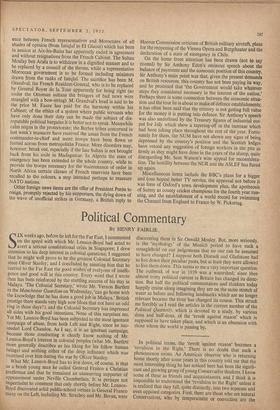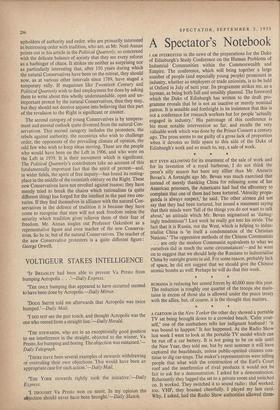Political Commentary
By HENRY FAIRLIE SIX weeks ago, before he left for the Far East, I commented on the speed with which Mr. Lennox-Boyd had acted to avert a serious constitutional crisis in Singapore; I drew attention to his deep interest in colonial questions; I suggested that he might well prove to be the greatest Colonial Secretary since Oliver Stanley; and I concluded by assuring him that he carried to the Far East the good wishes of eve'ryone of intelli- gence and good will in this country. Every word that I wrote then has been reinforced by the startling success of his stay in Malaya. 'The Colonial Secretary,' wrote Mr. Vernon Bartlett in the Manchester Guardian on Wednesday, 'can go home with the knowledge that he has done a good job in Malaya.' British prestige there stands very high now (does that not have an odd ring in these days?), and the Colonial Secretary has impressed all sides with his good intentions. None of this surprises me. Yet Mr. Lennox-Boyd has been subjected to the most ignorant campaign of abuse, from both Left and Right, since he suc- ceeded Lord Chandos. As I say, it is an ignorant campaign, because those conducting it clearly know nothing of Mr. Lennox-Boyd's interest in colonial peoples (what Mr. Bartlett more generally describes as his liking for his fellow human beings) and nothing either of the deep influence which was exercised over him during the war by Oliver Stanley.
What Mr. Lennox-Boyd has to live down, of course, is that as a brash young man he called General Franco a Christian gentleman and that he remained an unswerving supporter of appeasement under Neville Chamberlain. It is perhaps not impertinent to comment that only shortly before Mr. Lennox- Boyd discovered solid public-school virtues in General Franco many on the Left, including Mr. Strachey and Mr. Bevan, were discovering them in Sir Oswald Mosley. But, more seriously, is the 'mythology' of the Munich period to have such a stranglehold on our judgements that no one can be assumed to have changed? I suppose both Disraeli and Gladstone had to live down their peculiar pasts, but at least they were allowed to live them down. This seems to me a very important question. The outbreak of war in 1939 was a watershed; since then almost every political current in Britain has changed its direc- tion. But half the political commentators and thinkers today happily cruise along imagining they are on the same stretch of water as before and following landmarks which are no longer relevant because the river has changed its course. This struck me forcibly as I read the articles in the current number of the Political Quarterly, which is devoted to a study, by various dons and half-dons, of the 'revolt against reason' which is supposed to have taken place, and which is an obsession with those whom the world is passing by.
In political terms, the 'revolt against reason' becomes a 'revulsion to the Right.' There is no doubt that such a phenomenon exists. An American observer who is returning home shortly after some years in this country told me that the most interesting thing he has noticed here has been the signifi- cant and growing group of young Conservative thinkers. I know some of these as friends and acquaintances, and I think it is impossible to understand the 'revulsion to the Right' unless it is realised that they fall, quite distinctly, into two separate and even opposed categories. First, there are those who are natural Conservatives, who by temperament or conviction are the upholders of authority and order, who are primarily interested in buttressing order with tradition, who are, as Mr. Noel Annan points out in his article in the Political Quarterly, so concerned with the delicate balance of society that they see every reform as a harbinger of chaos. It strikes me neither as surprising nor as particularly interesting that, after 150 years during which the natural Conservatives have been on the retreat, they should now, as at various other intervals since 1789, have staged a temporary rally. If magazines like Twentieth Century and Political Quarterly wish to find employment for dons by asking them to write about this wholly understandable, open and un- important protest by the natural Conservatives, then they may, but they should not deceive anyone into believing that this part of the revulsion to the Right is significant or sinister.
The second category of young Conservatives is by tempera- ment and mental outlook quite divorced from the natural Con- servatives. This second category includes the protesters, the rebels against authority, the eccentrics who wish to challenge order, the opponents of the prevailing climate of opinion, the odd few who wish to keep ideas moving. These are the people who would have been on the Left in 1906, and who were on the Left in 1939. It is their movement which is significant. The Political Quarterly's contributors take no account of this fundamentally important fact that the spirit of protest—and, in wider fields, the spirit of free inquiry—has found its resting- place in the middle of the twentieth century on the Right. These new Conservatives have not revolted against reason; they have merely tried to break the chains which rationalism (a quite different thing) has forged for the intellect in the past two cen- turies. If they find themselves in alliance with the natural Con- servatives in the defence of tradition it is because they have come to recognise that men will not seek freedom unless the security which tradition gives relieves them of their fear of freedom. Mr. Annan singles out Professor Oakeshott as a representative figure and even teacher of the new Conserva- tives. So he is; but of the natural Conservatives. The teacher of the new Conservative protesters is a quite different figure : George Orwell.



































 Previous page
Previous page